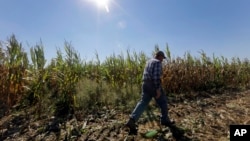WASHINGTON —
Legislation ending automatic payments to U.S. farmers and making international food aid more efficient is on its way to President Barack Obama's desk.
However, the legislation, passed by the Senate on Tuesday, has drawn criticism for its generous new subsidies and potential to violate international trade laws.
The farm bill governing agricultural policy, domestic and international food aid, and more, is estimated to cost nearly $1 trillion over 10 years. The House passed the measure last week.
According to the latest Congressional Budget Office estimates, the bill reduces spending by $16.6 billion.
End of direct payments
The largest part of the cuts is from ending a $5 billion-per-year "direct payment" subsidy that farmers received in good times and bad.
"We all agreed that direct payment subsidies could no longer be justified and needed to be eliminated," said Michigan Democrat Debbie Stabenow, chair of the Senate Agriculture Committee.
"We also knew that it was important to have a safety net for our farmers," she added.
Congress expanded subsidies for crop insurance and other programs that shield farmers from crop losses or market declines.
Supporters note that farmers have to spend their own money to buy crop insurance.
"You get a bill, not a check," Stabenow said. "And you don’t get any kind of help unless you have a loss."
The federal government pays more than half of the bill, which critics say is excessive.
Trade issues
Alternatively, farmers can choose a "counter-cyclical" program that pays a benefit when crop prices fall below a set point, but proposed limits on the amount of subsidy farmers could receive were removed.
"The result of that is going to be a counter-cyclical program that will be much more market-distorting than the current ones for a few crops," said Iowa Republican Chuck Grassley.
The World Trade Organization has ruled against the United States on an earlier version of the counter-cyclical subsidies, because they kept world market prices artificially low. The new subsidies may reopen that trade dispute.
Food aid
Advocates for international food aid reform cheered a small change in the Farm Bill that they say will make help available to hundreds of thousands more people.
While most U.S. food aid comes from American farmers and is transported on U.S.-flagged vessels, Congress will allow more funding to be spent on purchasing food closer to where it is needed.
Aid groups also can offer cash vouchers for beneficiaries to purchase food themselves.
Proponents say these tools are much more efficient, allowing U.S. aid to reach more people with the same resources.
Programs for the needy in the United States were a major stumbling block for negotiators.
The bill ultimately cut $8.5 billion from domestic food assistance programs by tightening eligibility requirements.
President Obama has said he will sign the bill.
However, the legislation, passed by the Senate on Tuesday, has drawn criticism for its generous new subsidies and potential to violate international trade laws.
The farm bill governing agricultural policy, domestic and international food aid, and more, is estimated to cost nearly $1 trillion over 10 years. The House passed the measure last week.
According to the latest Congressional Budget Office estimates, the bill reduces spending by $16.6 billion.
End of direct payments
The largest part of the cuts is from ending a $5 billion-per-year "direct payment" subsidy that farmers received in good times and bad.
"We all agreed that direct payment subsidies could no longer be justified and needed to be eliminated," said Michigan Democrat Debbie Stabenow, chair of the Senate Agriculture Committee.
"We also knew that it was important to have a safety net for our farmers," she added.
Congress expanded subsidies for crop insurance and other programs that shield farmers from crop losses or market declines.
Supporters note that farmers have to spend their own money to buy crop insurance.
"You get a bill, not a check," Stabenow said. "And you don’t get any kind of help unless you have a loss."
The federal government pays more than half of the bill, which critics say is excessive.
Trade issues
Alternatively, farmers can choose a "counter-cyclical" program that pays a benefit when crop prices fall below a set point, but proposed limits on the amount of subsidy farmers could receive were removed.
"The result of that is going to be a counter-cyclical program that will be much more market-distorting than the current ones for a few crops," said Iowa Republican Chuck Grassley.
The World Trade Organization has ruled against the United States on an earlier version of the counter-cyclical subsidies, because they kept world market prices artificially low. The new subsidies may reopen that trade dispute.
Food aid
Advocates for international food aid reform cheered a small change in the Farm Bill that they say will make help available to hundreds of thousands more people.
While most U.S. food aid comes from American farmers and is transported on U.S.-flagged vessels, Congress will allow more funding to be spent on purchasing food closer to where it is needed.
Aid groups also can offer cash vouchers for beneficiaries to purchase food themselves.
Proponents say these tools are much more efficient, allowing U.S. aid to reach more people with the same resources.
Programs for the needy in the United States were a major stumbling block for negotiators.
The bill ultimately cut $8.5 billion from domestic food assistance programs by tightening eligibility requirements.
President Obama has said he will sign the bill.








